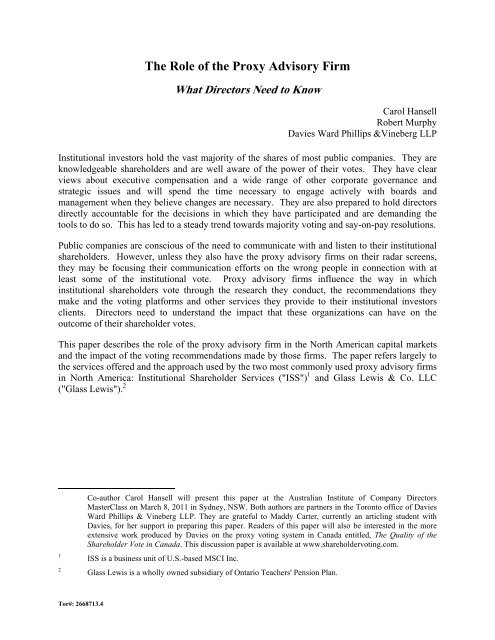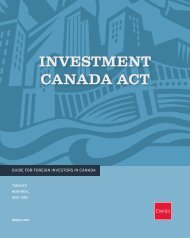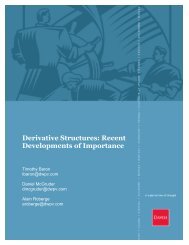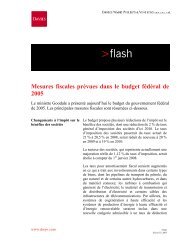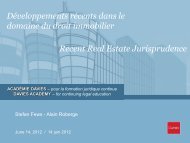The Role Of The Proxy Advisory Firm What Directors Need ... - Davies
The Role Of The Proxy Advisory Firm What Directors Need ... - Davies
The Role Of The Proxy Advisory Firm What Directors Need ... - Davies
You also want an ePaper? Increase the reach of your titles
YUMPU automatically turns print PDFs into web optimized ePapers that Google loves.
<strong>The</strong> <strong>Role</strong> of the <strong>Proxy</strong> <strong>Advisory</strong> <strong>Firm</strong><br />
<strong>What</strong> <strong>Directors</strong> <strong>Need</strong> to Know<br />
Carol Hansell<br />
Robert Murphy<br />
<strong>Davies</strong> Ward Phillips &Vineberg LLP<br />
Institutional investors hold the vast majority of the shares of most public companies. <strong>The</strong>y are<br />
knowledgeable shareholders and are well aware of the power of their votes. <strong>The</strong>y have clear<br />
views about executive compensation and a wide range of other corporate governance and<br />
strategic issues and will spend the time necessary to engage actively with boards and<br />
management when they believe changes are necessary. <strong>The</strong>y are also prepared to hold directors<br />
directly accountable for the decisions in which they have participated and are demanding the<br />
tools to do so. This has led to a steady trend towards majority voting and say-on-pay resolutions.<br />
Public companies are conscious of the need to communicate with and listen to their institutional<br />
shareholders. However, unless they also have the proxy advisory firms on their radar screens,<br />
they may be focusing their communication efforts on the wrong people in connection with at<br />
least some of the institutional vote. <strong>Proxy</strong> advisory firms influence the way in which<br />
institutional shareholders vote through the research they conduct, the recommendations they<br />
make and the voting platforms and other services they provide to their institutional investors<br />
clients. <strong>Directors</strong> need to understand the impact that these organizations can have on the<br />
outcome of their shareholder votes.<br />
This paper describes the role of the proxy advisory firm in the North American capital markets<br />
and the impact of the voting recommendations made by those firms. <strong>The</strong> paper refers largely to<br />
the services offered and the approach used by the two most commonly used proxy advisory firms<br />
in North America: Institutional Shareholder Services ("ISS") 1 and Glass Lewis & Co. LLC<br />
("Glass Lewis"). 2<br />
1<br />
2<br />
Co-author Carol Hansell will present this paper at the Australian Institute of Company <strong>Directors</strong><br />
MasterClass on March 8, 2011 in Sydney, NSW. Both authors are partners in the Toronto office of <strong>Davies</strong><br />
Ward Phillips & Vineberg LLP. <strong>The</strong>y are grateful to Maddy Carter, currently an articling student with<br />
<strong>Davies</strong>, for her support in preparing this paper. Readers of this paper will also be interested in the more<br />
extensive work produced by <strong>Davies</strong> on the proxy voting system in Canada entitled, <strong>The</strong> Quality of the<br />
Shareholder Vote in Canada. This discussion paper is available at www.shareholdervoting.com.<br />
ISS is a business unit of U.S.-based MSCI Inc.<br />
Glass Lewis is a wholly owned subsidiary of Ontario Teachers' Pension Plan.<br />
Tor#: 2668713.4
- 2 -<br />
1 Why Are Institutional Investors Concerned with <strong>The</strong>ir Voting Rights?<br />
<strong>The</strong> organizations broadly referred to as "institutional investors" include pension funds, mutual<br />
funds, money managers and similar organizations that invest money which they hold on behalf<br />
of others. <strong>The</strong> fiduciary nature of the relationship between the institution and the beneficiaries<br />
on whose behalf they invest means that the institution must use appropriate care in dealing with<br />
the assets in which they have invested. This has generally been seen to include an obligation to<br />
exercise the voting rights associated with those investments. In the United States, fund managers<br />
are required to vote proxies with the same diligence as making other fund decisions. Institutional<br />
investors in Canada take the same approach, even in the absence of a legislative requirement.<br />
<strong>Of</strong> course, institutional investors exercise their voting rights not simply to satisfy their legal<br />
obligations, but also to influence corporate conduct. Few institutions have an interest in<br />
governance issues just for the sake of governance – they are generally concerned with matters<br />
that come before the shareholders because of the impact they believe those matters can have on<br />
the value of the investment they have made in the issuer.<br />
2 Why Do Institutional Investors Engage <strong>Proxy</strong> <strong>Advisory</strong> <strong>Firm</strong>s?<br />
Why do institutional investors use proxy advisory firms to assist them in exercising their voting<br />
rights?<br />
An institutional investor typically holds positions in a range of issuers through a number of<br />
different accounts with a variety of intermediaries. Tracking record dates and proxy cut-off<br />
times, analyzing proxy materials and then casting the votes associated with the positions they<br />
hold can require significant resources. It is often more cost-effective for institutional investors to<br />
outsource to proxy advisors some or all of the functions involved in managing their voting rights.<br />
<strong>The</strong> proxy advisor will have the expertise and technology necessary to consolidate and manage<br />
all of the proxy materials to which its institutional investor clients are entitled, making sure that<br />
they receive the materials necessary to allow them to cast the votes to which they are entitled.<br />
Some institutional investors vote manually through their own platforms or through the basic<br />
<strong>Proxy</strong>Edge® voting service offered by Broadridge (neither of which feature integrated<br />
recommendations from third-party providers). However, many institutional investors use voting<br />
platforms offered by proxy advisors to facilitate the voting, recordkeeping, reporting and<br />
disclosure requirements of their clients. <strong>The</strong>y typically elect to have a set of recommendations<br />
integrated at the proposal level on each ballot as a default instruction (either the advisor's<br />
standard recommendations or custom recommendations developed by an advisory firm based on<br />
the client's policy). <strong>The</strong>y will also instruct the proxy advisor as to how and when they want to<br />
exercise their right to review and approve instructions prior to voting. <strong>The</strong> proxy advisor takes<br />
the instructions provided by their institutional investor clients and delivers those instructions in<br />
accordance with the regulatory requirements governing the proxy voting system.<br />
But how do institutional investors make their decisions about how to cast their votes? Most of<br />
the proxy season is concentrated in the first several months of the calendar year and more<br />
extensive disclosure requirements have multiplied the volume of reading and analysis necessary<br />
in order to absorb disclosures and make voting decisions. Rather than incurring the overhead<br />
Tor#: 2668713.4
- 3 -<br />
involved in maintaining research teams in place to keep abreast of market developments and to<br />
read and evaluate each proxy circular, many institutional investors use the research and analysis<br />
offered by the proxy advisory firms. Even institutions with sophisticated in-house teams that<br />
focus on governance and voting issues subscribe to the research reports of one or more of the<br />
proxy advisory firms to further inform their own views.<br />
Support with the voting mechanics and research are important aspects of the services provided<br />
by the proxy advisory firms, but the influence of the proxy advisor is really felt through the<br />
voting recommendations it issues with respect to matters that come before the shareholders.<br />
Those recommendations are grounded in the advisor's proxy voting guidelines (discussed in<br />
greater detail below) relating to matters that routinely come before a shareholder meeting or<br />
which might affect the view that an investor has of management. Some institutional investors<br />
may accept the voting policies of the proxy advisory firm as their own and where this is the case,<br />
the recommendation of the proxy advisory firm will automatically result in the votes of those<br />
clients being cast in accordance with its recommendation. Other clients have their own policies;<br />
if they use the voting platform of the proxy advisor, they will instruct the proxy advisor to vote<br />
in accordance with those policies. As noted above, the client may, of course, change the<br />
standing instruction with respect to any particular vote.<br />
In addition to creating their own analysis and recommendations, proxy advisory firms<br />
increasingly provide investors with custom analysis and recommendations based on an investor's<br />
policy. In some cases, the policy and recommendations may be in line with that of the advisory<br />
firm. In other cases, it will differ.<br />
In summary, proxy advisory firms such as ISS and Glass Lewis offer two types of services to<br />
their institutional investor clients. First, they assist their clients with the complex mechanics of<br />
managing their voting rights. Second, they provide research and analysis relevant to the issues<br />
on which their clients are entitled to vote and make recommendations about how those votes<br />
should be cast. Although these two types of services are separate (and some institutions use one<br />
service, but not the other) they are highly synergistic. Many institutional investors see<br />
economies in outsourcing all of the functions associated with exercising their voting rights to one<br />
proxy advisory firm.<br />
3 <strong>Proxy</strong> Voting Policies and Recommendations<br />
As noted above, proxy advisory firms develop governance guidelines, which they make publicly<br />
available. Issuers, and the capital markets community more broadly, are therefore aware of the<br />
general advice which the proxy advisors are providing to their institutional clients.<br />
ISS and Glass Lewis have different approaches to the development of their policies, including<br />
the selection of the factors that they consider and the weight they give to each of those factors.<br />
ISS seeks to reflect back to the issuer community the views of its institutional clients. It consults<br />
with its client institutions and provides them an opportunity to comment before its policies are<br />
finalized. It also communicates regularly with organizations representing institutional investors,<br />
including the Council for Institutional Investors (United States) and the Canadian Coalition for<br />
Good Governance (Canada). Glass Lewis, on the other hand, places greater reliance on its own<br />
Tor#: 2668713.4
- 4 -<br />
expertise and research, offering an independent perspective on the issues of concern to their<br />
clients.<br />
Before an institutional investor adopts the guidelines of a proxy advisor as its own, it will<br />
consider whether those guidelines and the proxy advisor's approach to conducting its analysis are<br />
in line with their own philosophy and can enable them to exercise their fiduciary responsibilities<br />
with respect to voting proxies. An institutional investor may delegate the evaluation and<br />
approval of a proxy advisor's policy to a proxy committee, fund board, compliance officer, chief<br />
operating officer or its portfolio managers (or may require review and approval at more than one<br />
level). If an investor chooses to vote in accordance with the proxy advisor's policy and<br />
recommendations, the investor always has the ability to review and override the advisor's<br />
recommendations prior to votes being cast or to re-vote up until the vote cut-off time. This will<br />
be particularly important, for example, in connection with high-profile meetings, meetings at<br />
companies where they have significant holdings or meetings with key issues on the agenda, such<br />
as a merger, contested director election or compensation issues. <strong>Of</strong> course, before a decision is<br />
made by an institution to deviate from the recommendations of the proxy advisory firm, some<br />
type of internal approval is usually also required. Understandably, the person responsible for<br />
making the voting decisions may only be inclined to seek such approval in the most compelling<br />
circumstances.<br />
4 Issuer Concerns with <strong>Proxy</strong> <strong>Advisory</strong> <strong>Firm</strong>s<br />
Increasingly, issuers are expressing concerns with the nature and extent of the influence of the<br />
proxy advisory firms. Several of the issues most frequently raised are canvassed below.<br />
(a)<br />
Degree of Influence<br />
<strong>The</strong> overarching concern that issuers have about proxy advisory firms is the degree of influence<br />
that they have on the way in which institutional investors vote. We are not aware of any<br />
statistics with respect to the number of institutional investors who adopt the voting policies of the<br />
proxy advisors as their own or the percentage of the shares voted in accordance with those<br />
policies. However, many issuers are convinced that the number of institutions that routinely<br />
follow the recommendations of the proxy advisors is significant. In a recent submission to the<br />
SEC on issues relating to the proxy voting system, U.S. pharmaceutical giant Pfizer noted that<br />
while large institutional investors may evaluate issuer disclosure themselves and make their own<br />
voting decisions, many smaller institutional investors lack the staff and other resources needed to<br />
carefully evaluate matters being voted on, and such investors base their votes largely or entirely<br />
on proxy firms’ recommendations. 3<br />
In its SEC submission, IBM noted the coincidence of ISS releasing its recommendations and a<br />
significant number of institutional investors casting their votes in accordance with ISS's<br />
recommendations. It cited voting patterns for a number of issuers as well as the voting patterns<br />
for its own meetings in 2009 and 2010. In those years, within a day of the release of the ISS<br />
recommendation, an estimated 13.5 percent and 11.9 percent of the total votes cast in each year<br />
3<br />
Comment letter from Pfizer Inc. to SEC, "Comments on Release No 34-62495; IA-3052; IC-29340; File<br />
No. S7-14-10" (23 November 2010).<br />
Tor#: 2668713.4
- 5 -<br />
were cast "lock-step" with ISS's recommendations. <strong>The</strong> submission noted further that "[T]o put<br />
that into proper perspective, the IBM voting block essentially controlled by ISS has more<br />
influence on the voting results than IBM's largest shareholder." 4<br />
Organizations such as the Council for Institutional Investors that represent the interests of<br />
institutional shareholders dispute the assertion that proxy advisors control the institutional vote.<br />
"<strong>The</strong> notion that proxy advisory firms 'control the institutional vote' wrongly assumes that<br />
institutions are a unified bloc of voters. In fact, many institutional investors are passive voters<br />
that defer routinely to the recommendations of management. We note that state and local<br />
pension funds, whose ranks include many of the most activist investors, hold just 6 percent of<br />
total outstanding equity."<br />
Others argue that while the voting patterns of institutional investors may reflect the fact that<br />
some institutions are quite passive in their approach to voting, their default position is in fact in<br />
favour of management, as opposed to being aligned with the recommendations of third-party<br />
advisors. This would reflect a sentiment on the part of the investor that so long as they are<br />
prepared to hold the stock, that can be read as support for management and their votes will<br />
typically be cast accordingly.<br />
(b)<br />
<strong>Proxy</strong> <strong>Advisory</strong> <strong>Firm</strong>s as Standard Setters<br />
Recognizing that the proxy advisory firms will have significant influence on the way in which<br />
votes are cast, issuers pay close attention to the proxy voting guidelines issued by these firms.<br />
Where possible, many issuers will align their approaches to governance, compensation and other<br />
matters to conform with the views of the proxy advisors. For this reason, many people regard<br />
the proxy advisors as being the true standard setters of governance and compensation practices<br />
and question whether the capital markets should accept the fact that this role is being played by<br />
private companies with no public policy mandate or oversight. <strong>The</strong> proxy advisors respond to<br />
this concern by noting that their views are either formed or accepted by the institutional investors<br />
who adopted their analysis and that it is entirely appropriate for institutional investors to have a<br />
significant degree of influence over these issues.<br />
A related concern is whether the proxy advisors have the flexibility to adapt their standard<br />
recommendations in situations where their guidelines are not appropriate for a particular issuer.<br />
Issuers are concerned that proxy advisors adopt a one-size-fits-all model to corporate governance<br />
and are reluctant to accept considerations such as financial stability, size and sector that might<br />
argue in favour of a more nuanced approach to governance for a particular issuer.<br />
ISS and Glass Lewis both believe that their analysis and recommendations are much more<br />
calibrated than this criticism suggests. ISS advises that it has country- and market-specific voting<br />
policies that reflect best practices in each market. In Canada, for example, it has two distinct<br />
proxy voting policies tailored for the different market components – TSX and TSX Venture.<br />
Within the TSX policy, ISS has a policy section that applies solely to the largest and most widely<br />
held companies in the S&P/TSX Composite Index. Beyond these differences, the Canadian<br />
4<br />
Comment letter from IBM to SEC, "Comments on Release No 34-62495; IA-3052; IC-29340; File No.<br />
S7-14-10" (15 October 2010).<br />
Tor#: 2668713.4
- 6 -<br />
policy is purposely drafted to provide flexibility where needed in order to be relevant for the<br />
Canadian "comply-or-explain" governance regime. ISS's Canadian analysts have some<br />
flexibility in applying policy taking into consideration the particular unique circumstances of a<br />
reporting issuer if warranted. In making voting recommendations, Glass Lewis advises that its<br />
analysts conduct a detailed analysis of each issue at each company. <strong>The</strong> Glass Lewis analysts<br />
have discretion to make case-by-case decisions for issues at all companies regardless of size,<br />
maturity, country or specific exchange listing.<br />
(c)<br />
Opportunities for Issuer Input<br />
Many issuers are critical of the quality of the analysis – and therefore of the credibility of the<br />
recommendations made on the basis of this analysis. <strong>The</strong>re is particular concern with the ability<br />
of the proxy advisors to analyze M&A transactions, including that they may lack the specialized<br />
expertise in specific sectors. Canadian issuer Kinross Gold Corporation notes that ISS's<br />
recommendation against its friendly combination transaction with Red Back Mining Inc. in<br />
September 2010 was not supported by geological or mining expertise. 5<br />
For routine matters as well as special matters, such as the approval of a transaction, issuers<br />
complain that there is not sufficient, if any, opportunity to comment on the analysis and<br />
recommendations of the proxy advisory firms in order to correct misinformation and faulty<br />
analysis or to engage in an open discussion about the views held by the proxy advisor.<br />
ISS and Glass Lewis take different perspectives on engaging with issuers before they issue their<br />
recommendations. For the most widely held companies in the relevant index, ISS circulates its<br />
report and recommendations to the issuer in advance of releasing it and gives the issuer an<br />
opportunity to vet the report for factual content only. Glass Lewis does not meet with issuers<br />
once the proxy materials have been sent out because they believe it is more appropriate to restrict<br />
their analysis and recommendations to the issuer's public disclosure. In special circumstances<br />
(for example, contested meetings and certain major), Glass Lewis will meet with the issuer and<br />
dissidents on a call with some of its clients. It does not, however, provide issuers with an<br />
opportunity to comment on its report and recommendations before it is released.<br />
Even when an issuer has the opportunity to comment, issuers such as Dupont note that they may<br />
only be given a day or to two to do so. Moreover, Dupont notes, "…[i]t has been our experience<br />
that substantive disagreements over content, such as peer group analyses, are rarely resolved in favor<br />
of the issuer." 6 It argues that issuers should be given a sufficient amount of time to review and<br />
comment on a proxy advisor's report and that, to the extent there is a disagreement that cannot be<br />
resolved through a formal appeals process, the proxy advisor's report should disclose that<br />
disagreement.<br />
5<br />
6<br />
Comment letter from Kinross Gold Corporation to SEC, "Comments on Release No 34-62495; IA-3052;<br />
IC-29340; File No. S7-14-10" (20 October 2010).<br />
Comment letter from Dupont to SEC, "Comments on Release No 34-62495; IA-3052; IC-29340; File No.<br />
S7-14-10" (20 October 2010).<br />
Tor#: 2668713.4
- 7 -<br />
(d)<br />
Conflicts of Interest<br />
Concern is often also expressed about conflicts of interest that may influence (or be seen to<br />
influence) the recommendations made by the proxy advisory firms. Conflicts may exist, for example,<br />
where the proxy advisory firm (or its shareholders or senior executives) have business relationships<br />
with issuers and investors.<br />
<strong>The</strong> potential conflict that attracts the most attention, however, arises when the proxy advisory firm<br />
offers advice to directors and managers of companies on how to improve the ratings that they assign.<br />
For example, this service is offered by ISS (but not by Glass Lewis).<br />
ISS has advised us that it mitigates conflicts of interest between these divisions in several ways.<br />
<strong>The</strong>y are run from different locations and are led by and staffed by different employees. <strong>The</strong>ir<br />
internal databases are not accessible outside of that division and are secured and password<br />
protected. It also makes available to its institutional clients the results of an independent<br />
third-party SAS 70 audit of its processes and internal controls for mitigating potential conflict.<br />
Still, many issuers believe that it is advisable for them to retain ISS to review their proxy circular<br />
in order to be sure that they will receive a favourable recommendation from the other side of the<br />
ISS house. Some believe that it is inappropriate for ISS to earn additional fees from issuers in<br />
connection with matters for which they earn fees from the institutional shareholders – regardless<br />
of whether or not the services provided to issuers increase the likelihood of a favourable<br />
recommendation.<br />
5 Regulatory Issues<br />
<strong>The</strong> role played by proxy advisory firms in the shareholder voting process is under review in a<br />
number of jurisdictions around the world.<br />
In July 2010, the SEC released a concept paper, soliciting comment on various aspects of the<br />
U.S. proxy system. It outlined some of the concerns that have been raised regarding the<br />
reliability, transparency, accountability, and integrity of the proxy system. This included issues<br />
relating to proxy advisory firm as well as some possible regulatory responses.. <strong>The</strong> SEC Concept<br />
Release states in part as follows: "…we are considering the extent to which the voting<br />
recommendations of proxy advisory firms serve the interests of investors in informed proxy<br />
voting and whether, and if so how, we should take steps to improve the utility of such<br />
recommendations to investors." <strong>The</strong> SEC received a large number of responses, including many<br />
commenting on various issues relating to proxy advisory firms. It is not yet clear what steps the<br />
SEC is proposing to take with respect to the matters raised in its concept paper or the comments<br />
it received in response.<br />
In the United Kingdom, the Financial Reporting Council released its U.K. Stewardship Code, in<br />
July 2010 as well, recommending a disclosure regime under which institutional investors<br />
disclose how they use proxy advisory firms.<br />
In January 2011, the Ontario Securities Commission (the securities regulatory in Canada's largest<br />
capital market) released a staff notice on shareholder democracy issues, asking the Canadian<br />
capital markets community whether the effectiveness of the proxy voting system (among other<br />
Tor#: 2668713.4
- 8 -<br />
things) requires additional review (and possibly regulation) at this time. <strong>The</strong> responses from the<br />
Canadian community will undoubtedly include issues relating to proxy advisory firms.<br />
6 <strong>What</strong>'s the Bottom Line?<br />
From the perspective of the issuer community, the concern with proxy advisory firms is that they<br />
can influence the outcome of a shareholder vote without appropriate accountability. While they<br />
are contractually accountable to their clients, there is no penalty for analysis that is, in the view<br />
of the issuers, flawed to the detriment of the issuers and their shareholders.<br />
From a director's perspective, it is important to be informed about the views of the proxy<br />
advisory firms regarding the organizations on whose boards they serve, as well as about the<br />
recommendations issued with respect to the matters put before their shareholders. This is also<br />
the time for issuers and their boards to make their views about proxy advisory firms and their<br />
processes known to securities regulators as well as to the institutional investor community that<br />
relies on those organizations.<br />
Tor#: 2668713.4


